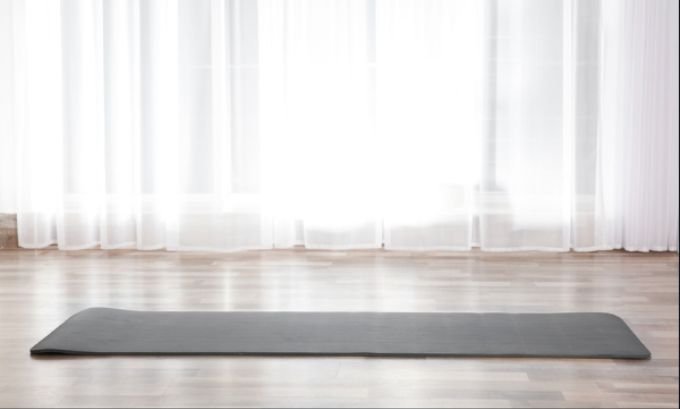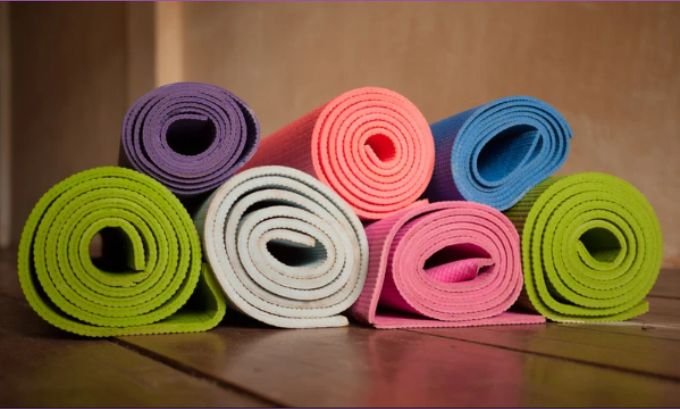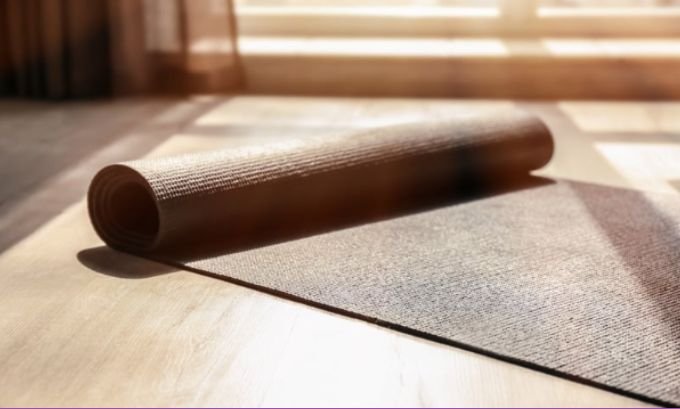Whether you’re a seasoned yogi or just starting your practice, selecting the right yoga mat can make all the difference in your experience on the mat. A good yoga mat provides stability, comfort, and support during poses, while a poor choice can lead to slipping, discomfort, and even injury.
With countless options available, from budget-friendly PVC mats to premium natural rubber varieties, finding the perfect match for your practice can feel overwhelming. The material, thickness, texture, and size all play crucial roles in how your mat performs during different types of yoga.
This comprehensive guide will walk you through everything you need to know about yoga mats, helping you make an informed decision that enhances your practice and fits your budget. By the end, you’ll understand which features matter most for your specific needs and how to maintain your investment for years to come.
Table of Contents
Understanding Yoga Mat Materials
The material of your yoga mat affects everything from grip and durability to environmental impact and price point. Each material offers distinct advantages and drawbacks.
PVC (Polyvinyl Chloride)
PVC mats remain the most common choice for studios and beginners. They offer excellent grip, especially when wet, and provide consistent performance across different temperatures. These mats typically last longer than natural alternatives and resist wear from frequent use.
However, PVC isn’t biodegradable and may contain harmful chemicals. Some people also experience allergic reactions to certain PVC formulations.
Natural Rubber
Natural rubber mats excel in providing superior grip and cushioning. They’re biodegradable and come from renewable sources, making them environmentally friendly. The material naturally prevents bacterial growth and offers excellent stability during challenging poses.
The main disadvantages include higher costs, heavier weight, and potential latex allergies. Some rubber mats also have a strong initial odor that fades over time.
TPE (Thermoplastic Elastomer)
TPE represents a middle ground between synthetic and natural materials. These mats are recyclable, lightweight, and free from latex and PVC. They provide decent grip and cushioning while maintaining affordability.
TPE mats may not last as long as PVC options and sometimes lack the superior grip of natural rubber during intense sessions.

Cork and Jute
Natural fiber mats like cork and jute appeal to environmentally conscious practitioners. Cork naturally repels moisture and bacteria while providing unique texture that improves with use. Jute offers durability and natural antimicrobial properties.
These materials require more maintenance and may not provide adequate cushioning for sensitive joints during floor poses.
Thickness: Finding Your Sweet Spot
Yoga mat thickness directly impacts comfort, stability, and portability. Understanding how different thicknesses affect your practice helps narrow down your options.
Standard Thickness (4-5mm)
Most yoga mats fall within this range, offering balanced cushioning and stability. This thickness works well for most yoga styles and practitioners, providing enough padding for floor poses while maintaining connection to the ground.
Thin Mats (1-3mm)
Travel mats and advanced practitioners often prefer thinner options. These mats enhance balance and stability by keeping you closer to the floor. They’re also lighter and more portable, making them ideal for frequent travelers.
Thick Mats (6-8mm)
Extra-thick mats benefit practitioners with sensitive joints, injuries, or those who prefer additional cushioning. They excel for restorative yoga, meditation, and floor-based practices but may compromise stability during standing poses.
Ultra-Thick Mats (10mm+)
These specialty mats cater to therapeutic practices, prenatal yoga, or individuals requiring maximum joint protection. While supremely comfortable, they can make balance poses challenging and may feel unstable for dynamic practices.
Texture and Grip: Staying Safe and Secure
The surface texture of your yoga mat determines how well you’ll grip during poses and whether you’ll slip during transitions.
Smooth surfaces work well for gentle practices but can become slippery when wet. Textured surfaces provide better grip but may feel uncomfortable during poses that require sliding or moving across the mat.
Some mats feature different textures on each side, offering versatility for different practice styles. Raised patterns, embossed designs, or natural textures like cork can enhance grip without feeling rough against skin.
Consider your primary yoga style when evaluating texture. Hot yoga practitioners need excellent wet-grip performance, while gentle yoga students may prioritize comfort over maximum traction.
Size Considerations
Standard yoga mats measure approximately 68 inches long by 24 inches wide. This size accommodates most practitioners for traditional poses and sequences.
Taller individuals (over 6 feet) should consider extra-long mats measuring 72-84 inches to ensure adequate space during poses like child’s pose or savasana. Some manufacturers offer custom lengths for particularly tall users.
Width becomes important for practitioners who prefer more space during lateral movements or those with broader shoulders. Extra-wide mats (26-30 inches) provide additional room but may not fit standard mat storage solutions.

Yoga Mat Comparison Table
| Material | Price Range | Durability | Grip | Eco-Friendly | Weight | Best For |
|---|---|---|---|---|---|---|
| PVC | $15-50 | High | Excellent | No | Medium | Beginners, studio use |
| Natural Rubber | $60-120 | Medium | Excellent | Yes | Heavy | Eco-conscious, hot yoga |
| TPE | $25-70 | Medium | Good | Moderate | Light | Travel, general practice |
| Cork | $80-150 | Medium | Good | Yes | Medium | Natural materials, antimicrobial |
| Jute | $40-90 | High | Moderate | Yes | Heavy | Durability, natural texture |
Caring for Your Yoga Mat
Proper maintenance extends your mat’s lifespan and keeps it hygienic for regular practice.
Daily Care
Wipe down your mat after each use with a damp cloth or mat spray. Allow it to air dry completely before rolling or storing to prevent mold and bacteria growth.
Deep Cleaning
Weekly deep cleaning involves gentle soap and water for most materials. Avoid harsh chemicals that can break down mat materials or leave slippery residues.
Natural rubber mats require special care—direct sunlight can cause degradation, so dry them in shade. PVC mats tolerate more aggressive cleaning but still benefit from gentle treatment.
Storage
Store mats flat when possible, or roll them loosely to prevent creasing. Avoid storing in hot cars or direct sunlight, which can warp or damage certain materials.
Frequently Asked Questions
How often should I replace my yoga mat?
Most yoga mats last 6-12 months with regular use, though high-quality options can last several years. Replace your mat when it shows significant wear, loses grip, or develops persistent odors that cleaning can’t eliminate.
Can I use a yoga mat for other exercises?
Yes, yoga mats work well for pilates, stretching, meditation, and light floor exercises. However, high-impact activities may damage the mat or require specialized equipment for optimal safety.
What’s the difference between a yoga mat and an exercise mat?
Yoga mats prioritize grip and stability for static poses, while exercise mats focus on cushioning for high-impact activities. Yoga mats are typically thinner and provide better traction.
Are expensive yoga mats worth the investment?
Premium mats often offer superior materials, better grip, longer lifespan, and environmental benefits. For regular practitioners, the improved performance and durability can justify higher costs.
How do I prevent my mat from slipping during practice?
Ensure your mat is clean and dry before use. Some practitioners use yoga towels on top of their mats for additional grip, especially during hot yoga sessions.
Making Your Final Decision
Choosing the perfect yoga mat depends on your individual needs, practice style, and budget. Consider where you’ll primarily practice, how often you’ll use your mat, and any physical considerations like joint sensitivity or allergies.
Start by identifying your must-have features, then compare options within your budget range. Reading reviews from practitioners with similar needs can provide valuable insights beyond manufacturer specifications.
Remember that the best yoga mat is one you’ll actually use consistently. Sometimes a mid-range option that meets most of your needs serves better than a premium mat that feels too precious for regular practice.
Invest time in your decision—a quality yoga mat enhances every aspect of your practice and can serve as a faithful companion on your wellness journey for years to come.
If you’re exploring different yoga mat materials and features, this detailed guide will help you choose wisely — and you can find wellness-inspired products at Tokyo Mart
